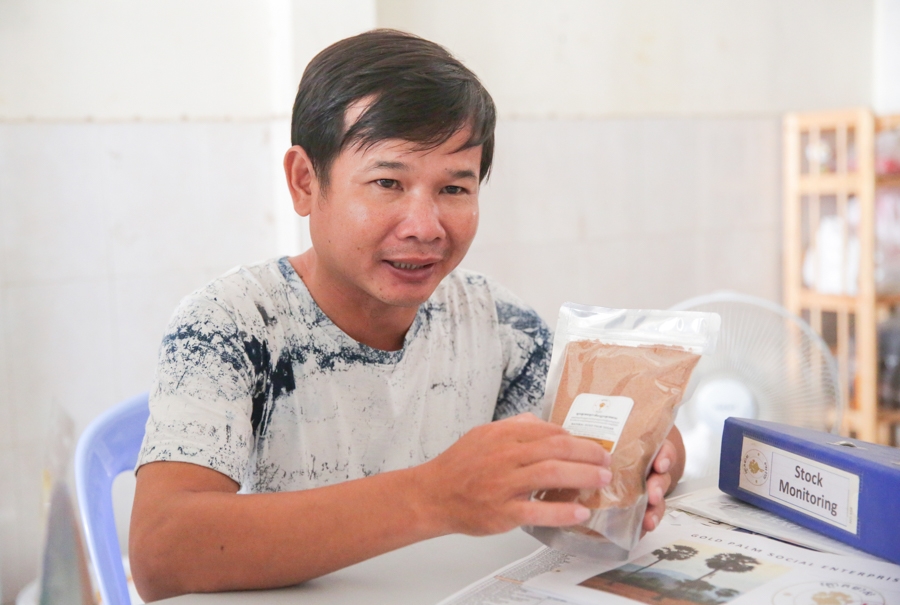A hard slog for Cambodia’s palm sugar producers
The palm sugar business in Cambodia is still in its infancy, with small- and medium-sized enterprises (SMEs) fighting an uphill battle to stay afloat in the midst of dwindling raw sugar supplies and competition from producers of adulterated sugar. Keo Chet, CEO of Natural Gold Palm Sugar, recently spoke to Khmer Times’ Sok Chan and touched on the challenges his SME faces in the palm sugar industry.
KT: Could you tell us why you decided to choose palm sugar as your main business?
Mr. Chet: The reason why I chose to run a palm sugar business is that I want to help the poor – especially farmers. These farmers are risking their lives daily collecting sap from the top of palm trees, where the flowers are. They don’t have any insurance. If they were to fall down from the trees and break their limbs, their livelihoods would be completely destroyed. So I set up this business to give them a fair price for their hard work.
KT: Most SMEs are facing issues concerning technical support, financing and market access. How does your business handle these problems?
Mr. Chet: I do acknowledge that there are problems. When we started in 2014, we almost had zero market sales. Our pure palm sugar is priced at $2.50 per kilogram, while the one mixed with chemicals is at $0.87 per kilogram. So for starters, we faced a huge uphill battle.
Secondly, we had to address issues like farmers migrating to the city to seek jobs and palm trees destroyed by natural disasters brought about by strong winds and floods. Also the logging of palm trees for soft wood is alarming. All these affect the supply of palm sugar.
Financing is the biggest headache because we need to invest further in packaging and innovative methods of processing so that we would be able to buy more palm sugar and stock it, to deal with the vagaries of supply and demand.
At the moment, we are finding it difficult to get loans from banks and microfinance institutions because they seem to be demanding collaterals.
KT: So how are you going to overcome these obstacles if you want to make your business sustainable and at the same time offer jobs to rural people?
Mr. Chet: First and foremost, I have to convince the supermarkets to display our products. I can pay for the barcode and the display space. Some supermarkets do not charge for the barcode, though, and that helps a lot. We don’t normally get our money back immediately from the supermarkets following the sales of our products. On the average, we have to wait for about three months. So that can affect our cash flow.
But I’m confident we can make it. More customers realize the value of our pure palm sugar and about 80 supermarkets are now stocking our products.
However, we need to be better on other fronts – like networking with other retail outlets and creating public awareness of our products.
KT: What was your initial capital investment? Also, how much raw palm sugar do you buy from the farmers?
Mr. Chet: We started off with an investment of $1,000. Presently we only sell three forms of palm sugar – powdered, disk and paste. We are looking for more investment capital to produce other forms of palm sugar.
On the supply side we get about 40 metric tons of raw palm sugar from the farmers. When we have more capital, we hope to increase our supply to 2,000 metric tons. This will benefit more than 500 farmers.
Currently, we have 44 farmer families in our Kampong Thom palm sugar community. In Kampong Thom province we pay the farmers 4,500 riel ($1.12) per kilogram for the raw palm sugar. In Kampong Speu province, it is also 4,500 riel per kilogram. In Pursat province we are paying 3,300 riel per kilogram. The price we pay depends on the farmers’ base cost of production.
KT: Palm sugar with geographical indication (GI) status and organic palm sugar are a hit with consumers. How do you build public trust for natural palm sugar?
Mr. Chet: First let me point out that there are many things to fulfil before GI status certification, together with organic certification are granted by the relevant authorities – both locally and internationally.
Kampong Speu palm sugar is expected to receive its GI status certification from the European Commission’s Directorate-General for Agriculture and Rural Development this year. Last year European Union accepted Cambodia’s application for a GI status and was now verifying all information related to the origin of the palm sugar in order for it to be sold in the EU.
Soon, we will be the authorized dealers to sell GI palm sugar in the local market. At this moment, to build public confidence, we have to ensure that no chemicals are mixed into the palm sugar we are selling.
KT: What are your next plans?
Mr. Chet: We are trying to expand our market and are looking towards Asean. We are also carrying out our own research to see how we can improve our packaging.
We intend to raise more capital to build a warehouse that adheres to international hygiene standards. The warehouse will have refrigeration so that we can easily store about 100 metric tons of raw palm sugar, without the risk of it going bad.
KT: What is your advice on boosting the local palm sugar industry?
Mr. Chet: Firstly, stop cutting down palm trees. Please let them grow. Also, there must be more honesty in the industry. Unscrupulous traders, who mix chemicals into palm sugar to make it taste sweeter, should be rooted out.
Finally, we urge supermarkets to be more understanding of small- and medium-sized enterprises. If they remit our money to us after three or six months, we will have cash problems.
Source: http://www.khmertimeskh.com/news/37674/a-hard-slog-for-cambodia—s-palm-sugar-producers/


 English
English




